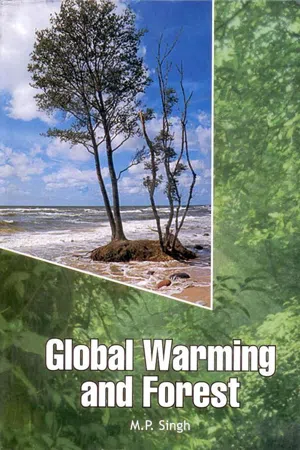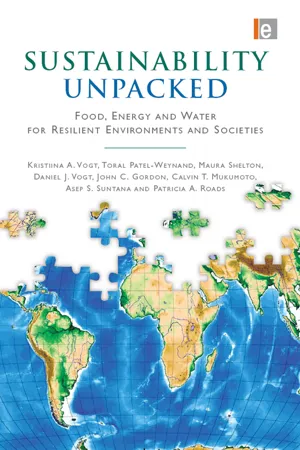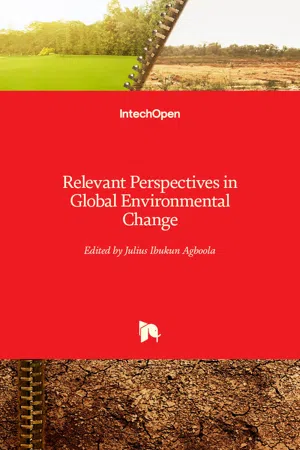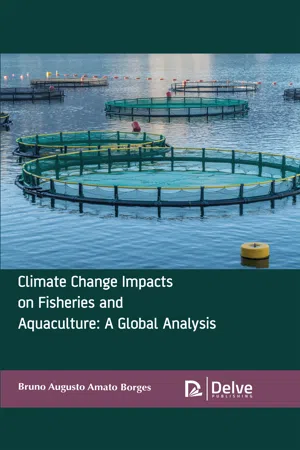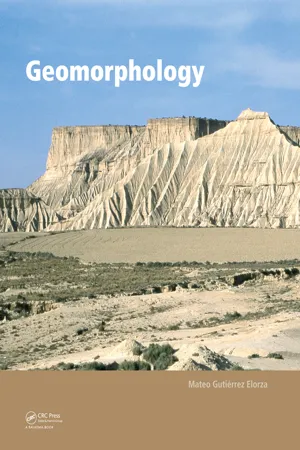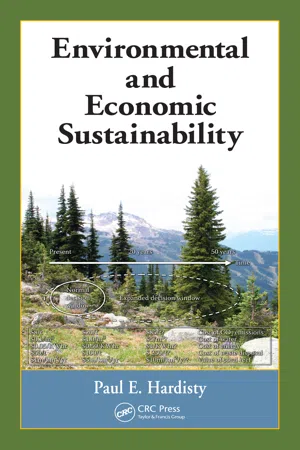Geography
Climate Change and Sustainability
Climate change refers to long-term shifts in temperature, precipitation, and other atmospheric conditions, largely driven by human activities such as burning fossil fuels and deforestation. Sustainability involves meeting the needs of the present without compromising the ability of future generations to meet their own needs, often through responsible resource management and environmental conservation efforts. Both concepts are critical in understanding the interactions between human societies and the natural environment.
Written by Perlego with AI-assistance
Related key terms
1 of 5
9 Key excerpts on "Climate Change and Sustainability"
- eBook - PDF
- Stephen Scoffham(Author)
- 2016(Publication Date)
- Routledge(Publisher)
This example is typical of how geography can provide a real focus point for cross-curricular work (Figure 13.4). Some issues are current but also long-term, which gives ample scope for curriculum planning, although they can be daunting to tackle. Perhaps the most challenging of these is rapid climate change, as it poses immediate and real threats to the status quo of life on Earth and is now generally agreed to be attributable to human activity through the use of fossil fuels. The Intergovernmental Panel on Climate Change (IPCC) was established in 1988 to synthesise and report on the science and research of climate change and this extract from their 2014 report, starkly summarises the situation: n n n n GEOGRAPHY AND SUSTAINABILITY EDUCATION 183 n Warming of the climate system is unequivocal, and since the 1950s, many of the observed changes are unprecedented over decades to millennia. The atmosphere and ocean have warmed, the amounts of snow and ice have diminished, and sea level has risen. (IPCC 2014: §1.1) Understanding the language of this debate requires sound underpinning with subject knowledge and facts before the more value-laden aspects of how we might respond are explored. ‘Climate change’ refers to the fluctuation of climate conditions on Earth over vary- ing periods and is a variation that we know we can expect to happen again. However, ‘rapid climate change’ differentiates the unexpectedly fast pace of change, which is lead- ing to environmental conditions to which humans and other living creatures may find it hard to adapt. ‘Global warming’ is a natural phenomenon thanks to the presence of carbon PAULA OWENS n n n n n 184 n Figure 13.4 A letter from a Year 3 pupil, Eastchurch School, Isle of Sheppey, Kent, following a visit to a local nature reserve - eBook - PDF
Knowledge Management in Tourism
Policy and Governance Applications
- Eduardo Fayos-Sola, Joao Albino Matos de Silva, Jafar Jafari, Eduardo Fayos-Sola, Joao Albino Matos de Silva, Jafar Jafari, Jafar Jafari, Liping Cai(Authors)
- 2012(Publication Date)
- Emerald Group Publishing Limited(Publisher)
Recommendations around governance and policy, adapta-tion and mitigation, and knowledge management, research and education needs for climate change and tourism are also provided. UNDERSTANDING CLIMATE CHANGE Climate change is a term that refers to any long-term significant change in average temperature, precipitation, and/or wind patterns. Such changes are attributed to increases in greenhouse gases (GHGs) (carbon dioxide, methane, nitrous oxide, etc.) often as a result of human activities. GHGs absorb heat from the sun in the atmosphere and reduce the amount of heat Climate Change, Sustainability, and Tourism 155 escaping; it is this extra heat that has been found to be the cause of observed changes in the earth’s climate system. The United Nations Framework Convention on Climate Change (UNFCCC) defined it as ‘‘a change of climate which is attributed directly or indirectly to human activity that alters the composition of the global atmosphere and which is in addition to natural climate variability observed over comparable time periods’’ ( 1992 , Article 1). The earth’s climate has always varied naturally. However, in the last century and over the last 30 or 40 years specifically, there has been increased concern regarding observed increases in human-induced GHGs and the resulting changes. These human-induced GHGs may arise from activities such as burning fossil fuels (oil, coal, gas), using energy generated from the burning of fossil fuels, land clearing, and logging, and some aspects of farming, among others. Impacts of climate change include increases in global air and ocean temperatures, decreasing snow and ice cover, global sea-level rise, coral bleaching, water shortages and/or supply restrictions, changing rainfall patterns, greater dry season severity and higher summer temperatures, as well as increased frequency and severity of storms, cyclones, floods, fires, and droughts. - eBook - PDF
- Singh, M P(Authors)
- 2021(Publication Date)
- Daya Publishing House(Publisher)
These effects on individual countries and societies maybe assessed by estimating how the climate is likely to change at the local or regional level, and how this change might affect both the natural and the human environment on which people depend for their survival. The United Nations Environment Programme (UNEP) (1993) reviewed these effects and possible impacts of climate changes both on the natural environmental and on human society, taking as a deference standard the Intergovernmental Panel on Climate Change (IPCC) Working Group II assumptions: an increase in GHGs equivalent to a This ebook is exclusively for this university only. Cannot be resold/distributed. doubling of pre-industrial atmospheric carbon dioxide by 2025-2050 for a business as usual scenario; a corresponding increase in global mean temperature from 1.5 to 4.5°C; and a sea-level rise from 0.3 to 0.5 m by the year 2050 and of about 1 m by 2100 (see IPCC, 1990; Jager and Ferguson, 1991; Houghton et al, 1992). The likely impacts of climate change were analysed first for the natural environment: Ice and snow; Oceans and coasts; The hydrological cycle; and Ecosystems and vegetation. Secondly, the possible effects of climate change on human society were assessed, in terms of: Water resources; Food and agriculture; Coastal dwellers; Economic activity; and Human settlements and health. Of course, impacts will occur in more complicated ways, and impacts on one sector will affect those on other sectors. Impact on Natural Resources Climate change is likely to exert considerable stress on natural resources throughout Asia. This continent has over 60 per cent of the world’s population; its natural resources already are under stress. Most sectors in Asia show weak resilience to climate change. Many countries depend socio economically on such natural resources as water, forests, grassland, rangeland, and fisheries. - eBook - ePub
Sustainability Unpacked
Food, Energy and Water for Resilient Environments and Societies
- Kristiina Vogt, Toral Patel-Weynand, Maura Shelton, Daniel J Vogt, John Gordon, Cal Mukumoto, Asep. S. Suntana, Patricia A. Roads, John C. Gordon(Authors)
- 2012(Publication Date)
- Routledge(Publisher)
Until climate change – which history tells us is inevitable (de Blij, 2005) – alters the biotic and abiotic environment at any given location, we can identify what opportunities exist today for a country to use its own resources for social and economic development. We need to recognize the constraints that climates impose on our ability to make sustainable choices. For example, an examination of the world climate map shows how countries such as Russia face obstacles to social development that are a result of most of their contiguous lands being located at latitudes greater than 40 degrees (de Blij, 2005). These obstacles are real despite the fact that Russia is the largest country in the world and has a significant land-base that could be used to grow and extract bio-resources. However, Russia has most of its land-base located in climatically restrictive environments where it is more difficult to increase the land's productive capacity. This demonstrates that the total land area is not a very useful metric to determine what choices a country has to develop its resource capital. A large land-base does not provide food security if most of it is located in areas where temperature limits plant growth. In Russia, the overriding climate control of a land's productive capacity is clearly evident.Understanding the variable impacts of climate change across the diversity of biomes is fundamental to decoding sustainability and human survival. Humans have a long history of dealing with the impacts of climate change in environments that are either conducive for their survival or where human survival is mostly at the subsistence level. Furthermore, because climate change is not going to be uniformly layered across the globe, understanding the interplay between climates and the provision of bio-resources is crucial for society. Thus, climate change will strongly influence human development and wellbeing, as well as determining where it will be easier for humans to survive.Even though climate is a great social equalizer because it does not selectively impact just the poor or the rich, people across the entire human development spectrum are forced to adapt. All members of human society have to adapt to the changing climate or any other constraints that have been introduced into their environment. However, rich people, with more mechanisms in place to adapt to an altered environment, are less susceptible to climate change.Why People Migrate: Geography andClimate Influences on Humans
Past human responses to changing climates:Become a foreigner
It is not new for humans to migrate and expand their resource footprint at the same time. History has shown that humans pursued ephemeral and seasonal resources like many other animals. Humans have a history of being ‘foreigners’. This has been a successful strategy that necessitated humans following the food source, such as Laplanders migrating with reindeer, or travelling to areas with higher pulses of abundant food supplies, such as Mongols travelling to grassland steppes where plants were most actively growing at the time (Fagan, 2008). At times human migration was driven by the need to search for new lands because population densities had become too high to feed the entire population from the existing land-base. This was a strong driver for the peoples who later became Norwegians and Danes to travel and colonize Greenland and Iceland (Diamond, 2005). - Julius Ibukun Agboola(Author)
- 2011(Publication Date)
- IntechOpen(Publisher)
2.1 Climate change Climate change is one of several large-scale environmental changes to which human activities make a significant contribution, and that, in turn, affects human health and well-being. The Intergovernmental Panel on Climate Change (IPCC) concluded: “warming of the climate system is unequivocal, as is now evident from observations of increases in global average air and ocean temperatures, widespread melting of snow and ice, and rising global average sea level (IPCC 2007).” Over the past decade, the fact that emissions of greenhouse gases due to human activities are affecting the world's climate has become clear (Ebi 2011). In addition: “most of the observed increase in globally averaged temperatures since the mid-twentieth century is very likely due to the observed increase in anthropogenic greenhouse gas concentrations.” These changes have begun to affect morbidity and mortality worldwide, with projections suggesting that overall health burdens will increase with increasing climate change. Although all countries are projected to experience increased health risks, those at greatest risk include the urban poor, older adults, children, traditional societies, subsistence farmers, and coastal populations, particularly in low-income countries (Ebi 2011). The task of understanding climate change and predicting future change would be complex enough if only natural forcing mechanisms were involved. It is significantly more daunting because of the introduction of anthropogenic forcing and even more so considering the limitations in available records. 2.2 Land use Landscapes are changing worldwide, as natural land covers like forests, grasslands, and deserts are being converted to human-dominated ecosystems, including cities, agriculture, and forestry. Between 2000-2010, approximately 13 million hectares of land (an area the size Relevant Perspectives in Global Environmental Change 6 of Greece) were converted each year to other land cover types (FAO 2010).- eBook - PDF
Climate Change Impacts on Fisheries and Aquaculture
A Global Analysis
- Bruno Augusto Amato Borges(Author)
- 2019(Publication Date)
- Delve Publishing(Publisher)
This marked the beginning of modern climate era. The climate changes have been attributed to the variation in sunlight that Earth receives and retains. Climate change is the biggest threat that this planet faces at the present. It refers to the difference in the planet’s climate over a period of time. The changes that have taken place can be attributed to natural as well as man-made causes. In other words, climate change refers to significant alterations in patterns of weather which is beyond what was predicted, and which has a long-term impact. It brings about abnormal variations and, in most cases, it is experienced at a global level. For example, melting of ice caps at the poles. The greenhouse gases (GHGs) like carbon dioxide traps heat. This was proved in the 19 th century. Their ability to affect the transfer of infrared energy through the atmosphere is the scientific basis of many instruments flown by NASA. There is little doubt about the fact that GHGs are responsible for this climate change (Figure 1.1). Climate Change: A Global Perspective 3 Figure 1.1: Effect of global warming on earth. Source: https://upload.wikimedia.org/wikipedia/commons/1/13/2015_Annual_ Temperature_Local_Records.jpg. 1.2. HISTORY OF CLIMATE CHANGE It was not easy to convince the population that human activities can have a significant impact on the Earth’s climate and weather patterns. In the 1800s, several studies suggested that the carbon dioxide released in the atmosphere could accumulate and insulate Earth. However, this fact was not met with much concern on the scientific community. In the 1950s, the levels of CO 2 as revealed in the readings, offered data that could prove that the global warming theory had veracity. Eventually, other researches were conducted which along with climate modeling proved that global warming was an actual problem, and could have consequences for the Earth dynamics. - eBook - PDF
- Mateo Gutierrez(Author)
- 2012(Publication Date)
- CRC Press(Publisher)
19 ENVIRONMENTAL CHANGE 1. Introduction 2. The Earth’s climate system 3. Climate change and the greenhouse effect 4. Anthropogenic change 5. Toward sustainable development 19.1 Introduction Climate, sea level, vegetation zones, animal populations, soils, and landforms have all changed throughout Earth his- tory (Goudie, 1977a, 1992) but during the Quaternary con- tinuous environmental changes over very short time periods have become more obvious. From a geomorphic perspective, these recent environ- mental changes result from three basic causes: geological, climatic, and anthropogenic. Because the factors that trig- ger these changes interact or act together, it is it difficult to assess the contribution of each to environmental change. Changes of the geological environment are pri- marily due to neotectonic activity (Fig. 19.1), which may be significant in areas located along active plate margins where isostatic readjustments and relative lithospheric plate move- ments cause significant topographic change. Thus in moun- tain deserts and depressions (Mabbutt, 1977) that have notable crustal instability such in the western United States and central Asia, landforms will be affected by this activity. In contrast, shield deserts and platforms like the Sahara, India, and Australia are generally not affected by this endogenetic activity; it is easier to study of climate change in the latter areas because tectonic activity does not interfere. Although humans have populated the Earth for six or seven million years (Anderson et al., 2007) their interac- tion with the environment became important only during the agricultural revolution of the last 10,000 years and more so in the recent industrial and medical revolutions (Goudie, 1981b, 2006). Humans affect vegetation, fauna, soil, water, and climate, and thus man is considered a geomorphic agent (Nir, 1983) because human activities modify the glo- bal surface (Fig. 19.2) and in turn interfere with geomorphic processes. - UN Environment(Author)
- 2019(Publication Date)
- Cambridge University Press(Publisher)
{2.5.1} Climate change is a priority issue affecting both human systems, including human health, and natural systems – air, biological diversity, freshwater, oceans and land – and which alters the complex interactions between those systems (well established). Historical and ongoing greenhouse gas emissions have committed the world to an extended period of climate change (well established), which is leading to global warming of air and ocean; rising sea-levels; melting glaciers, permafrost and Arctic sea ice; changes in carbon, biogeochemical and global water cycles; food security crises; fresh water scarcity; and 2.1 Drivers of environmental change, megatrends and governance challenges Human population dynamics or trends, particularly population pressure, and economic development have been acknowledged for many decades as the primary drivers of environmental change (well established). More recently, rapid urbanization and accelerating technological innovation have been additional influences. There are wide disparities globally in the consumption and production patterns that lie behind those drivers. {2.1.1, 2.2} Those driving forces are also strongly intertwined, complex, and spread widely and unevenly across the world (well established). They are megatrends, developing at speeds with which responses by established governance structures at all levels – urban and rural, local, national, regional, global and supranational – are thus far insufficient to keep pace. {2.1.1} The global population in 2018 is some 7.5 billion, with median projections estimating nearly 10 billion by 2050 and nearly 11 billion by 2100 (United Nations figures) (well established). Increases in life expectancy and reductions in infant and other mortality mean that population growth rates will continue to remain positive in all regions except Europe and certain parts of Asia.- eBook - PDF
- Paul E. Hardisty(Author)
- 2010(Publication Date)
- CRC Press(Publisher)
Unfortunately, there has been too little action over the past four decades, and a real balance between economy, environment, and society remains but a distant hope. The importance of this balance, and the urgency with which we must find it, are brought into imposing relief by two facts. The first is that, by every measure, we 46 Environmental and Economic Sustainability are now accelerating ever more rapidly on our current unsustainable course. The global population continues to grow. Fossil fuel consumption, the biggest current contributor to the GHG emissions that drive climate change, increased 35% from 2006 to 2007, releasing over 55 billion tonnes of carbon dioxide and other insulating gases into the atmosphere. 96 Deforestation, another major GHG contributor, contin-ues to accelerate as forests are cleared for lumber and to make way for agriculture (including ironically, bio-fuels). Yet, despite the now very clear evidence of the dam-age that these emissions cause, we continue to rip up the remaining forests, burn ever more gas in ever more cars, and build new coal-fired power stations using old inefficient technology. Despite the warnings of the IPCC and scientists around the world, and even after decades of mainstream discussions about the need for action, we continue to obfuscate, procrastinate, and deny the need for change. T IME TO C HANGE D IRECTION We are now many more on the planet than we were two centuries ago, and Earth is no longer the limitless universe it once seemed to be. At every level, in every part of the world, the magnitude of our impact on the planet can be clearly seen. We can no longer continue to exploit the natural world at a pace that exceeds its ability to regen-erate. This is not only because key resources will be exhausted, but also because as we eliminate the natural habitats that these resources embody, we erode the funda-mental ecosystems that maintain life on Earth.
Index pages curate the most relevant extracts from our library of academic textbooks. They’ve been created using an in-house natural language model (NLM), each adding context and meaning to key research topics.


